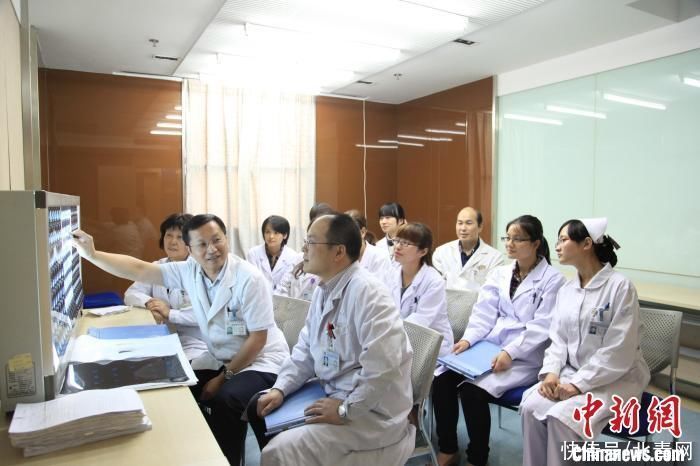
Feng Jifeng, Secretary of the Party Committee of Jiangsu Cancer Hospital, presided over the case discussion. (Data map) Photo courtesy of Jiangsu Cancer Hospital
China News Service, Nanjing, June 9 (Xu Linhua, Xu Shanshan) In recent years, immunotherapy has been increasingly recognized for non-small cell lung cancer. Shen Bo, deputy director and chief physician of the Department of Internal Medicine of Jiangsu Cancer Hospital, said recently that immunotherapy has opened a window of hope for some people, but in clinical use, it is actually a “double-edged sword”, and there are still many misunderstandings that need to be avoided.
Immunotherapy is a series of immune-related treatments that use the body’s own immune system to destroy tumor cells.
“During treatment, the immune system attacks both tumor cells and healthy cells, which can lead to interstitial pneumonia, immune encephalitis, skin damage, gastrointestinal mucosal damage and other problems.” Shen Bo believes that , During and after tumor immunotherapy, it is necessary to closely follow patients, keep abreast of the situation, collect relevant data, and gradually form a systematic management system for adverse reactions caused by tumor immunotherapy.
Many patients with advanced lung cancer want to try immunotherapy, and there are many cases of off-label use in clinical practice. Shen Bo said that some gene mutation types will make immunotherapy have a positive effect, and some gene mutations will have a reverse effect. If a patient uses immune drugs, not only will they not be able to prolong their survival time, but they will have serious side effects. Clinicians must strictly screen out patients who meet the indications. When necessary, the patient’s treatment approach is determined through multidisciplinary consultation.
Immunotherapy was once called “magic medicine”. In this regard, Shen Bo said that clinicians do not regard immunotherapy and targeted therapy as the only treatment options for most patients, but choose first-line treatment plans in accordance with relevant domestic and foreign guidelines to ensure the standardization of initial treatment.
“The concept of personalized precision treatment and multidisciplinary diagnosis and treatment will always run through the whole process of tumor treatment.” Shen Bo said that in immune or targeted therapy, doctors usually combine a variety of treatment methods Do combination therapy, such as targeted drug + chemotherapy, immunotherapy + chemotherapy, immunotherapy + anti-angiogenesis therapy, etc.
The latest cancer registration data released by the Jiangsu Provincial Center for Disease Control and Prevention shows that there are about 270,200 new cancer cases and 168,600 cancer deaths in Jiangsu every year. Feng Jifeng, chairman of the Professional Committee of Cancer Clinical Chemotherapy of the Chinese Anti-Cancer Association and secretary of the Party Committee of Jiangsu Cancer Hospital, said that the survival period of cancer patients is closely related to the clinical stage. The earlier it is detected, the better the chance of cure. The 5-year survival rate of patients with stage I lung cancer is 50% to 70%, and that of stage IV disease is only 2% to 5%. Therefore, early screening, early diagnosis, and early treatment are particularly important. (End)
(China News Network)